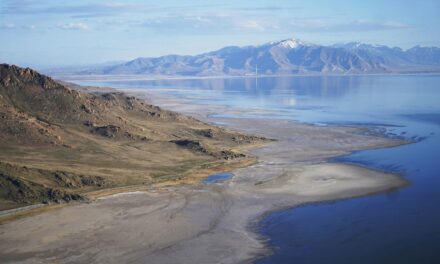If you live in America, there are at least three certainties you can bank on: death, taxes and hurricane season. And you don’t have to live on the coasts of the country to have experience with hurricanes and tropical storms. In 2020, Tropical Storm Cristobal washed out roads in Wisconsin and caused flash flooding. In 2011, nearly every river in Vermont flooded when the aftermath of Hurricane Irene passed through the state.
Hurricane season begins on June 1st and ends in November, although mid-August to mid-October are the highest risk times. On Monday, the new head of the Federal Emergency Management Agency (FEMA), David Richardson, announced during “a daily all-hands meeting held by phone and videoconference” that he had only recently learned that a hurricane season exists.
That’s doesn’t seem like a very funny thing to say and it caused widespread alarm among FEMA staff. Nonetheless, a spokesperson for FEMA’s parent agency, the Homeland Security Department, insists that Richardson’s remark was “a joke.”
The spokesperson said under Homeland Security Secretary Kristi Noem and Richardson “FEMA is shifting from bloated, DC-centric dead weight to a lean, deployable disaster force that empowers state actors to provide relief for their citizens.”
That’s gobbledygook for “the states are going to be almost completely on their own from now on” when it comes to natural disasters, including hurricanes and tropical storms. But there’s one more certainty in American life that I didn’t mention.
When there is a natural disaster and people are dissatisfied with the government response, they blame the president of the United States and his political party. This happens when the charge is fair, as with Hurricane Katrina in 2005 , and even when its not, as with the Great Flood of 1993 that inundated the Mississippi River basin for 200 days, or with the Deepwater Horizon oil spill in the Gulf of Mexico that humbled the Obama administration in 2010.
Trump and the Republican Party should be able to anticipate that they will become punching bags when an eviscerated FEMA is unable to provide sufficient assistance during a future major catastrophe.
Trump has said FEMA should be shrunk or even eliminated, arguing states can take on many of its functions, as part of a wider downsizing of the federal government. About 2,000 full-time FEMA staff, one-third of its total, have been terminated or voluntarily left the agency since the start of the Trump administration in January.
Richardson actually succeeded in preventing even deeper cuts, but we’ll see how long that lasts.
Despite Noem’s prior comments that she plans to eliminate FEMA, in May she approved Richardson’s request to retain more than 2,600 short-term disaster response and recovery employees whose terms were set to expire this year, one of the sources said, confirming an earlier report by NBC News.
Those short-term staff make up the highest proportion of FEMA employees, about 40%, and are a pillar of the agency’s on-the-ground response efforts.
This is likely to come to a head almost immediately, as “the National Oceanic and Atmospheric Administration forecast last week that this year’s season is expected to bring as many as 10 hurricanes.” That’s about average, actually. Typically, there will be three annual hurricanes that reach a Category 3 or above rating and another seven that remain at Category 1 or 2. What matters is how many storms make landfall, and even tropical storms that never reach hurricane wind speeds can cause severe flooding.
One reason President George W. Bush suffered so much reputational damage from the FEMA response to Hurricane Katrina is that he had chosen Michael Brown to head the agency, and Brown had no experience in disaster management. His career prior to FEMA was highlighted by a 12-year run as the Judges and Stewards Commissioner for the International Arabian Horse Association.
David Richardson is at least a Marine veteran who commanded soldiers in the field as an artillery officer. That’s more promising than Brown’s résumé. But he has no more direct emergency response experience than Brown had, and he’s overseeing the destruction of the agency he’s been chosen to lead.
This will not end well, but at least for once the correct people will get the blame.







